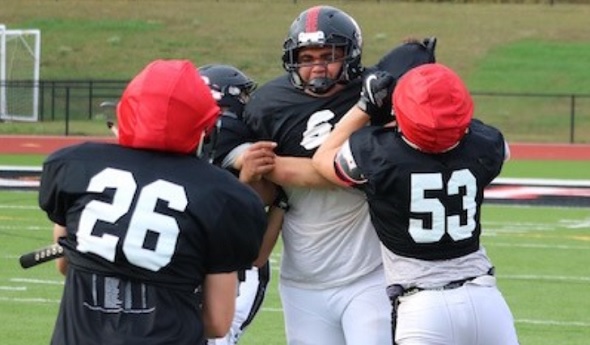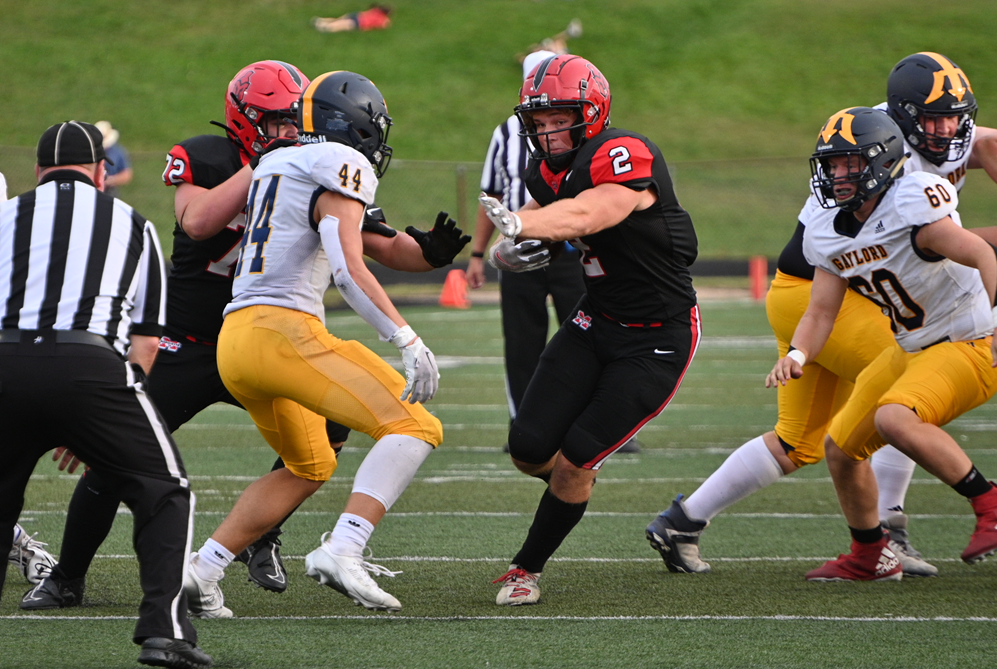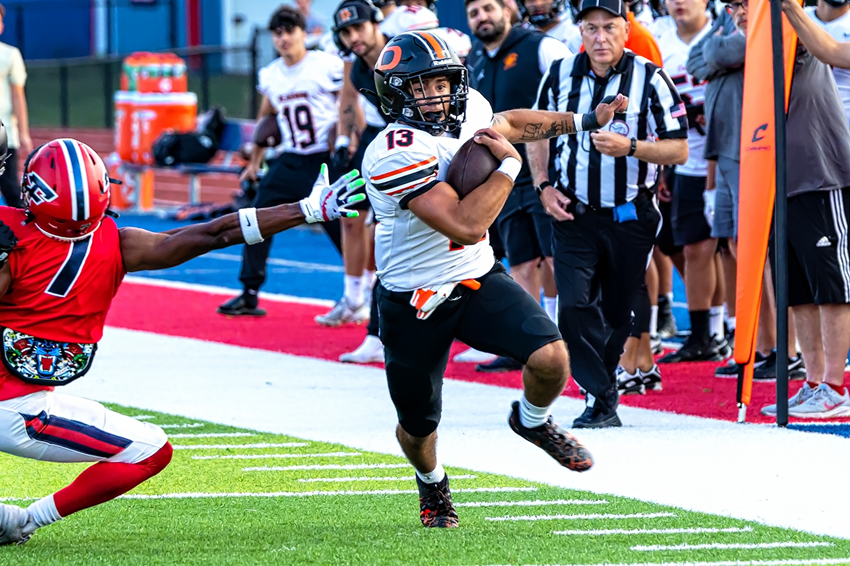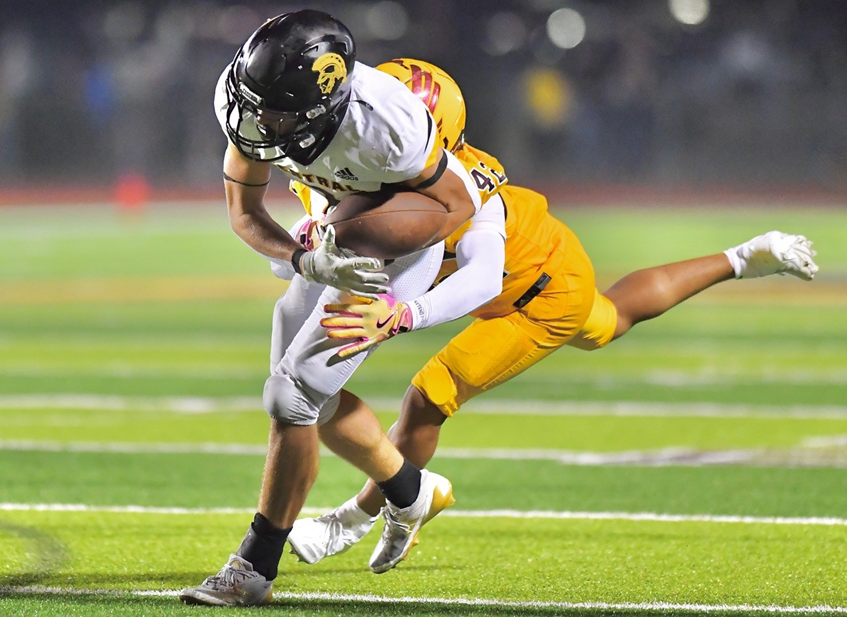
Ford Swaps Frustration for Focus
October 24, 2017
By Tim Robinson
Special for Second Half
Midway through the 2016 season, Marcus Ford was frustrated.
 He was on the Pinckney football team, but not playing much.
He was on the Pinckney football team, but not playing much.
A big part of that was due to his size — 6-foot-5 and over 400 pounds — but then-defensive coordinator Rod Beaton sensed there was more.
“We feel that we coach very hard,” said Beaton, now Pinckney’s head coach. “We’re very aggressive (on the varsity), and sometimes it’s an adjustment for juniors to understand that when they come out here, there’s expectations.
“There were a couple times where Marcus was questioning … whether football was for him.”
“I didn’t want to be there,” Ford said. “I thought, ‘This is stupid. Why am I here so late?’”
And then came a change.
“It came to a point where he went home and took a day off to re-gather himself,” Beaton said. “Marcus came back and he said to me, ‘Coach, I really want to be a part of things here.’”
And Ford did more than that.
He grew from a young man who bristled when his coaches pointed out mistakes to one who doesn’t react as if it were a personal attack, from an overweight kid who admits he was on his way to weighing 600 pounds to a big kid who is a key part of Livingston County’s most successful football team as a senior.
He rarely comes out of games, his coach says, and the quiet giant who rarely interacted with his teammates has transformed into a happy, smiling kid who dishes out and takes teasing from them.
It’s a story of transformation that only football could have done for Marcus Ford, who couldn’t play youth football because of his size and whose options for high school athletics seemed limited to football for the same reason.
“I may sound a little clichéd and corny,” Beaton said, “but I think this is why every single coach in America coaches football, to watch the development of a young man, from freshman to sophomore to junior and to see what football has done for him.”
How did Ford do it?
He turned his mental approach 180 degrees and made drastic changes to his diet and work ethic.
One clue came in looking at Pinckney’s roster from 2016 compared to 2017. Last year, Ford was listed at 380, which was about 40 pounds less than his actual weight.
This year, he’s listed at 405, which is a dozen pounds more than what he weighs now.
Last year, he played mostly in mop-up roles.
This year, he is a starter on defense, regularly occupying two blockers at a time, which in turn frees linebackers Cauy Hendee and Levi Collins to make tackles.
“I can play a lot longer,” he said. “I was tired when we were out there, but we don’t believe in the word ‘tired.’ We prefer ‘winded.’ We just need to catch our breath. So I get ‘winded’ a lot less.”
The first thing Marcus decided to change was his diet, and he got his cues by looking in the mirror.
“I didn’t like the muffin cap that was hanging down,” he said. “I didn’t like my stomach hanging over. ... I thought, ‘I don’t what to have a heart attack at age 25.’ I was doing ‘diets,’ per se, but eventually I thought, ‘This is stupid. Cut out pop and eat better,’ And I did.
“The only thing I would eat that was green was green beans, and they had to be made a certain way,” he said. “Now, I’m more like ‘this is somewhat appetizing. Let me try that.’ I don’t eat candy bars anymore. I don’t eat ice cream when my family does. I drink a lot less milk than I used to, and I drink more water.”
 Pinckney offensive coordinator Cody Patton noticed.
Pinckney offensive coordinator Cody Patton noticed.
“His mom came to me about getting a weight plan, and he stuck with it,” Patton said. “They can only do so much in the weight room. When they leave, there’s not much you can control what they put into their bodies.”
But Ford also changed his mindset about football and being coached.
“His first real commitment was ninth-grade high school football, and it was a big adjustment for him,” Beaton said. “We knew there would be days where he might be a little confrontational, there may be some days where he goes through the motions.”
But after that midseason meeting last year, Ford redoubled his efforts in practice and in the offseason.
The first hint that he was a different player came in June, when Ford earned the team’s first bone helmet sticker of the season for effort in a drill.
“It was our first pursuit drill,” Beaton said. “We go four downs, and those kids have to sprint. There’s no exception. Marcus stepped to his gap, made his reads, flew to the football and didn’t say a word, every single time. He did it four times in a row. It really set the stage. I could tell he was wanting do to things right this year.
“When you see a 6-5, 400-pound kid moving with effort and tenacity, you sit there and go, ‘That young man can help us.’”
And so he has.
As a result, Marcus Ford is part of a Pinckney defense that has lifted the Pirates to an 8-1 regular-season record and shared Southeastern Conference White championship. He has transformed from a player who had little stamina to one who can go from opening kickoff to final horn.
“He can play a whole football game,” Beaton said. “He can go through a whole practice. One of the challenges we were talking about in the offseason is he has to put his body and mind in a position to not come off the field.”
That moment came on a warm night early in the season.
“We were in a huddle at Chelsea, and it was late,” Beaton recalled. “He’s drenched in sweat, and I said, ‘Marcus, you need a breather?’ And he said, ‘No, coach. I’m ready.’ That’s pretty cool.”
Asked his ideal weight, Ford said, “I would like to be at 250 if I could,” then laughs. His bone structure is such that at his height, he would be almost gaunt at 250. “I would settle for 340. That’s the dream within a dream goal.”
Next year, he plans to attend college.
“I want to go into bartending or being a head chef, or get a business degree,” he said. “One other choice is going to a police academy. As long as I can run a mile within 15 minutes, I should be good.”
There’s no reason, now, to think he couldn’t accomplish that.
He got his first sack against Dexter.
‘I grabbed him and rolled him over on top of me,” Marcus said. “I would have liked to have landed on him, but I got him down in the backfield. It’s good.”
And football now is fun.
“A lot more fun,” he said.
“Marcus made a concerted effort to our strength and agility program,” Beaton said. “It wasn’t two days at a time, then not be there five or six days. Marcus was there. He would stay after everyone had left and get some extra lifts in or do some extra work to make sure he was putting himself in a (good) position.
“He said, ‘Coach, I want to be your starting nose (tackle).’ The first day of June camp, he ran out to the nose tackle, and we haven’t looked back.”
PHOTO: (Top) A pair of Pinckney blockers try to contain nose tackle Marcus Ford during a practice this season. (Middle) Ford breaks free to get an arm on a ball carrier. (Photos by Tim Robinson.)

1st & Goal: 2024 Week 3 Review
By
Geoff Kimmerly
MHSAA.com senior editor
September 16, 2024
What a difference a year can make.
 We are only one-third through the 2024 football regular season, and already several teams are outperforming how they finished a year ago – or are on the verge of doing so.
We are only one-third through the 2024 football regular season, and already several teams are outperforming how they finished a year ago – or are on the verge of doing so.
After a maximum of only three games played, 25 teams statewide have guaranteed they’ll finish with better records this fall than in 2023. Another 54 teams already have as many wins this fall as they had all of last season – and we note several of both groups below in this week’s review.
Bay & Thumb
HEADLINER Grand Blanc 22, Saginaw Heritage 21 Heritage’s emergence the last few seasons has made a powerful Saginaw Valley League Red even more competitive, and the title this season could be up for grabs until the end. Grand Blanc (2-1) sits atop the standings at 2-0 in league play thanks in part to Nate Szczembara blocking what would have been a winning Heritage field goal on this game’s last play. Click for more from WJRT.
Grand Blanc blocks the Saginaw Heritage game winning FG to win 22-21
Powered by @LawrenceTechU pic.twitter.com/5OG8hyT3oR
— STATE CHAMPS! Michigan (@statechampsmich) September 14, 2024
Watch list Midland Dow 28, Mount Pleasant 7 After tough opening losses to two strong opponents, Dow (1-2) got its first win over another annual playoff qualifier, the reigning SVL Blue champion Oilers (1-2), who had defeated the Chargers 42-7 a year ago.
On the move Chesaning 47, New Lothrop 22 The reigning Mid-Michigan Activities Conference champion improved to 3-0 by doubling up last season’s league runner-up Hornets (1-2). Montrose 20, Durand 14 Staying the MMAC, Montrose (2-1) now might be Chesaning’s top challenger after defeating a Durand team (2-1) that was coming off a win over New Lothrop in Week 2. Frankenmuth 48, Alma 7 Frankenmuth (3-0) became the 14th program on record to reach 500 wins, this one making the Eagles 500-165-4 since the school opened in 1956.
Greater Detroit
HEADLINER Pontiac Notre Dame Prep 42, Grand Rapids Catholic Central 0 Notre Dame Prep already was considered among the elite in Division 5 this season, entering the weekend ranked No. 3 in the coaches poll. But the Fighting Irish (3-0) may now be the favorites after this stunning win over the top-ranked and reigning champion Cougars (2-1) – which followed NDP’s Week 2 victory over 2023 Division 7 champion Jackson Lumen Christi. Click for more from the Detroit News.
Check out the highlights of Notre Dame Prep's 42-0 victory over the defending Division 5 State Champs in Grand Rapids Catholic Central from September 13th, 2024. Powered by @reactiontech@NDPrep_Football pic.twitter.com/PKumIOSYkP
— STATE CHAMPS! Michigan (@statechampsmich) September 15, 2024
Watch list Rochester Adams 21, West Bloomfield 14 Ryland Watters scored twice during the second half and Adams (3-0) stopped West Bloomfield’s final rally six yards from a potential tying score to avenge a pair of losses to the Lakers (1-2) from a year ago, including in their District opener.
On the move Warren De La Salle Collegiate 38, Orchard Lake St. Mary’s 28 De La Salle (3-0) withstood a challenge from an improved St. Mary’s team (2-1) to set up this week’s meeting with reigning Catholic High School League Central champion Toledo Central Catholic. Detroit Catholic Central 45, Harper Woods 12 The Shamrocks (3-1) also continued to impress, scoring the most points that reigning Division 4 champion Harper Woods (1-2) had given up since 2021. Sterling Heights Stevenson 24, Clinton Township Chippewa Valley 7 After two straight sub-.500 seasons (although Stevenson did make the playoffs last year at 4-5), the Titans are 3-0 for the first time since 2009 after avenging a pair of losses to Chippewa Valley (1-2) from a year ago.
Mid-Michigan
HEADLINER Brighton 29, Northville 28 (2OT) Brighton (2-1) was another team to avenge a pair of 2023 losses during Week 3, after falling to Northville during both the regular season and Division 1 playoffs last fall. Northville (1-2) is the reigning Kensington Lakes Activities Association West champion, but the Bulldogs are one of three teams atop the standings early this fall thanks to winning this one on a double-overtime 2-point conversion. Click for more from the Livingston Daily Press & Argus.
Check out the highlights from Brighton in their 29-28 victory over Northville!@MHSAA | @godogs_football pic.twitter.com/apDaNSFfPw
— STATE CHAMPS! Michigan (@statechampsmich) September 14, 2024
Watch list Olivet 7, Lansing Sexton 0 The Eagles (2-1) bounced back from a Week 2 loss to Portland to avenge a 48-12 loss to Sexton (1-2) from a year ago – and pull within one more win of equaling last season’s victory total.
On the move Corunna 49, Ortonville Brandon 21 The Cavaliers (3-0) graduated some serious star power in the spring but just keep grinding, with this league-opening double-up of Brandon (2-1) extending their regular-season win streak to 12. East Lansing 38, Grand Ledge 21 East Lansing’s speed is immediately obvious and stunning, and the Trojans (2-1) bounced back from a Week 2 loss to Hudsonville by pulling away from the physical Comets (2-1) during the second half in front of an overflowing Homecoming crowd. Ithaca 35, Saginaw Michigan Lutheran Seminary 14 Ithaca (3-0) also gained an important early advantage with a league-opening win, as these two decided last year’s Tri-Valley Conference White title, won by the Yellowjackets.

Northern Lower Peninsula
HEADLINER McBain 29, Beal City 25 McBain (3-0) ended Beal City’s 21-game Highland Conference winning streak, which dated to the start of 2021 and included three wins over the Ramblers. The Aggies (2-1) had defeated McBain 48-7 last season on the way to winning league, District and Regional titles. Click for more from the Cadillac News.
Watch list Ogemaw Heights 12, Gladwin 7 It wouldn’t be stunning if this eventually ends up deciding the Jack Pine Conference Division 1 championship – and it also wouldn’t be stunning if these two end up meeting again in the playoffs, as Ogemaw Heights (3-0) entered the weekend ranked No. 5 in Division 5 and Gladwin (2-1) was No. 8.
On the move LeRoy Pine River 21, Lake City 6 Pine River (1-2) has won only five games combined over the last five seasons, but this one could provide a spark as it was the Bucks’ first over Lake City (1-2) since 2016. Cheboygan 30, Elk Rapids 23 Cheboygan (2-1) is one of the season’s early success stories, as the Chiefs already have bested last year’s 1-8 finish – and with another win can guarantee their most since 2019. Boyne City 45, Charlevoix 21 This was a major victory for Boyne City (2-1) heading into a loaded Northern Michigan Football League Legends schedule, as Charlevoix (1-2) is the reigning champion in the NMFL Leaders and Boyne finished third in the Leaders last season.
Southeast & Border
HEADLINER Hanover-Horton 49, Grass Lake 21 Hanover-Horton (3-0) continues to look like a team with promising possibilities this fall, and this win was notable for several reasons – it guaranteed the Comets will finish better than last year’s 2-7 record, avenged 32-22 and 28-6 losses to Grass Lake from last season, and came against a Warriors team (2-1) that has finished below .500 only once over the last 22 seasons, according to Michigan-Football.com. Click for more from the Jackson Citizen Patriot.
Watch list Jackson 28, Tecumseh 20 We’ll know more once the Southeastern Conference White schedule gets rolling – Jackson also started 4-1 last season and finished 4-5. But the Vikings are 3-0 after this league opener, and that’s included avenging last year’s loss to Monroe.
On the move Ottawa Lake Whiteford 44, Buchanan 16 This was a solid bounce-back for the Bobcats (2-1) after a Week 2 loss to Ida. Buchanan is 1-2 against an opening schedule of teams that are a combined 7-2. Hudson 16, Ida 8 After a reasonably close opening loss to still-undefeated Fowler, Hudson (2-1) has handed first defeats this season to Dowagiac and now the Bluestreaks (2-1). Michigan Center 14, Jonesville 6 Michigan Center (1-2) was another team with a difficult opening slate, but the Cardinals got on the board with this win over a Jonesville team (1-2) that finished Cascades Conference West runner-up a year ago.

Southwest Corridor
HEADLINER Constantine 31, Schoolcraft 29 (OT) Constantine (3-0) extended its winning streak in this rivalry to three with a second-straight by one score, stopping Schoolcraft’s 2-point conversion attempt in overtime to finish the victory. Schoolcraft (2-1) had pulled even with 1:09 to play in regulation after the teams traded leads five times. Click for more from the Kalamazoo Gazette.
Watch list Berrien Springs 28, Traverse City St. Francis 14 The Shamrocks (1-2) may have started 0-2 for the second season in a row, but they made a splash by handing the Gladiators (2-1) their first defeat of the season. This one could mean a lot later as well as Berrien Springs works to extend a decade-long playoff streak.
On the move Galesburg-Augusta 17, Allegan 14 With back-to-back wins over Cassopolis and now Allegan (2-1), Galesburg-August (2-1) has equaled its win total of a year ago. Lawton 27, Kalamazoo United 18 Lawton (2-1) was coming off a loss to St. Francis but found its footing in handing United (2-1) its first defeat. Niles 56, Three Rivers 6 Niles (2-1) opened its Wolverine Conference schedule with a 10th-straight league win and has scored at least 49 points in all 10.
Upper Peninsula
HEADLINER Marquette 30, Gaylord 0 Marquette’s opening statement on this season keeps getting louder, as the Sentinels are up to two losses avenged from a year ago – they fell to Gaylord 37-16 in 2023 – and they have yet to give up a point, outscoring their first three opponents by a combined 136-0. The most major test yet is coming up, as Marquette travels to Lowell this week. Click for more from the Marquette Mining Journal.
Ford Richardson finds Kyler Sager on 3rd down for a 99 yard TD.
Marquette moves to 3-0 with a 30-0 win over Gaylord tonight.
The Sentinels are now outscoring their opponents by 136-0 margin through 3 weeks. pic.twitter.com/EKyyj6aMAc
— Jake Durant (@durant_jd) September 15, 2024
Watch list Gwinn 33, L’Anse 6 Gwinn (2-1) had only four wins over the last three seasons combined, and both last year against the same opponent. But the Modeltowners opened this fall by avenging a 2023 loss to Bridgeport and have now equaled last season’s total of two victories – with plenty of opportunities to add to that coming up.
On the move Negaunee 29, Calumet 0 The Miners (3-0) will head into this week’s major clash with Kingsford coming off their first shutout of the season having stopped a Copper Kings offense that had put up 80 points over two victories to start the fall. Houghton 38, Hancock 16 The Gremlins (1-2) have won three straight over their neighbors and will see Hancock (1-2) again in the regular-season finale. Menominee 58, Ishpeming Westwood 19 This early surge has played out almost identically to the start of last year’s run to the Division 7 championship game, as Menominee has scored a combined 170 points and given up just 25 over the first three weeks.
West Michigan
HEADLINER Grand Rapids South Christian 41, Grand Rapids West Catholic 38 The Sailors (3-0) will come barreling into the Ottawa-Kent Conference Green schedule this week after a second comeback win and this one against the No. 2-ranked team in Division 5. The Sailors trailed 24-14 at halftime before rallying and sending the Falcons to 1-2. Click for more from FOX 17.
Check out the highlights of South Christian's 41-38 win over West Catholic 41-38 on September 13, 2024. Powered by @CAM_Association @sailorsports | @SCsailorFB pic.twitter.com/e2Eyw5NAyD
— STATE CHAMPS! Michigan (@statechampsmich) September 15, 2024
Watch list East Kentwood 41, Caledonia 35 East Kentwood’s anticipated rise may be starting. The Falcons ended a three-game losing streak against Caledonia – and hadn’t scored in their previous two meetings with the Fighting Scots (2-1). East Kentwood (2-1) needs one more win to equal last season’s total.
On the move Grand Rapids Forest Hills Central 17, Grand Rapids Forest Hills Northern 14 This was the closest game these rivals have played since restarting their series, but FHC (3-0) prevailed again to make it 10 wins in 10 meetings since 2016. Hudsonville Unity Christian 44, Ada Forest Hills Eastern 20 Unity Christian (3-0) is on its way back up after winning just three games a year ago. FHE (2-1) had entered the weekend No. 4 in Division 4, one slot ahead of the Crusaders. Big Rapids 33, Reed City 14 This matchup played a big part in deciding the Central State Activities Association Gold title a year ago, and could again with reigning co-champion Big Rapids (2-1) in a good spot after handing Reed City (2-1) a first loss.
8-Player
HEADLINER Climax-Scotts 56, Adrian Lenawee Christian 35 Lenawee Christian (1-2) jumped out to a 14-0 lead, but Climax-Scotts (2-1) took over from there to avenge last season’s 56-16 Regional Final loss to the eventual Division 2 champion. Click for more from the Battle Creek Enquirer.
Watch list Ishpeming 50, Gaylord St. Mary 28 It’s been common to see traditionally strong 11-player programs move to 8-player and find immediate success, and Ishpeming looks like it could be the next. The Hematites were 7-4 in 11-player last season and are off to a 2-0 start with this win over playoff regular St. Mary (2-1).
On the move Crystal Falls Forest Park 42, Norway 20 The Trojans (3-0) ended a string of two straight losses to the Knights (2-1), and after falling to them 40-6 last season. Grand Rapids NorthPointe Christian 46, Bridgman 38 A week after Bridgman’s 35-game winning streak ended, NorthPointe (2-1) handed the Bees (1-2) a second-straight defeat, avenging last year’s 28-8 loss. Portland St. Patrick 56, Mount Pleasant Sacred Heart 49 The Shamrocks (3-0) had lost to Sacred Heart the last two seasons, including by just a point a year ago. Vestaburg 38, Carson City-Crystal 30 Vestaburg ended its 21-game losing streak, and against a league champion from 2023.
MHSAA.com's weekly “1st & Goal” previews and reviews are powered by MI Student Aid, a division within the Department of Lifelong Education, Advancement, and Potential (MiLEAP). MI Student Aid encourages students to pursue postsecondary education by providing access to student financial resources and information. MI Student Aid administers the state’s scholarship and grant programs that help make college Accessible, Affordable and Attainable for you. Click to connect with MI Student Aid and find more information on Facebook and Twitter @mistudentaid.
PHOTOS (Top) Marquette's Grant Simon (2) finds a hole to pick up several yards against Gaylord. (Middle) Suna Chami (13) breaks down the sideline during Dearborn's 28-13 win over Livonia Franklin. (Below) A Traverse City Central ball carrier works to secure possession during a 49-14 loss to Davison. (Top photo by Cara Kamps, middle photo by Douglas Bargerstock, below photo by Terry Lyons.)

